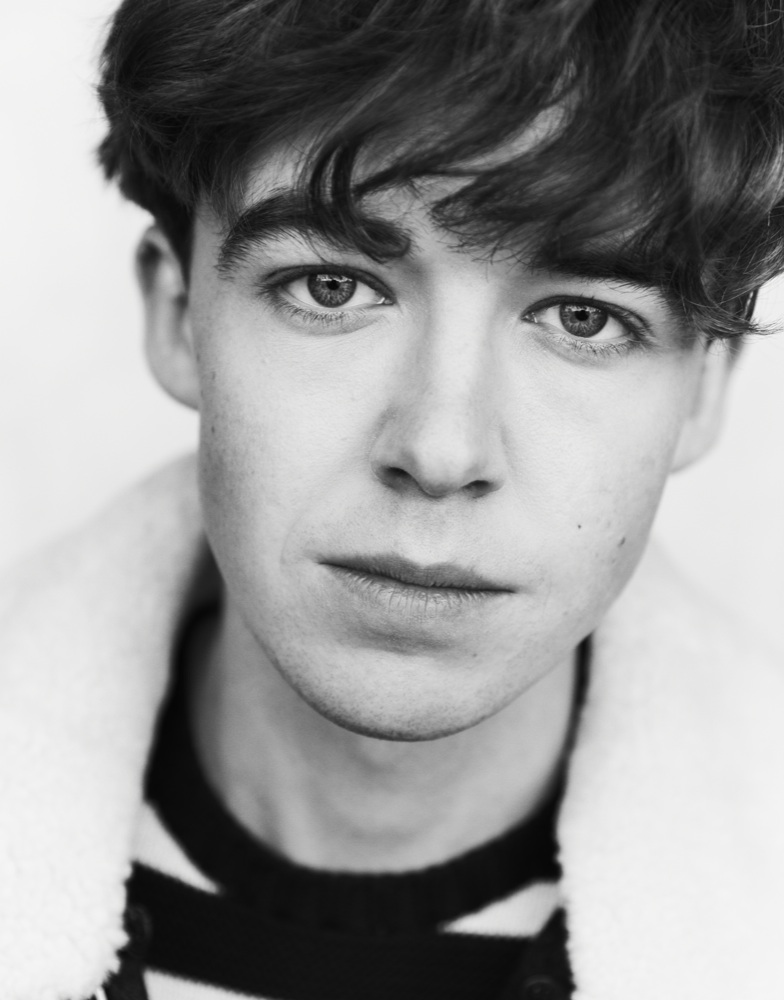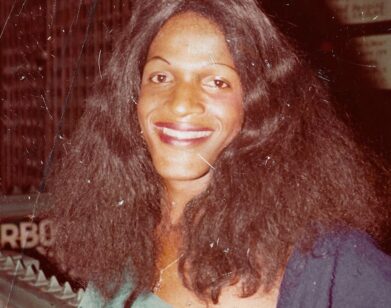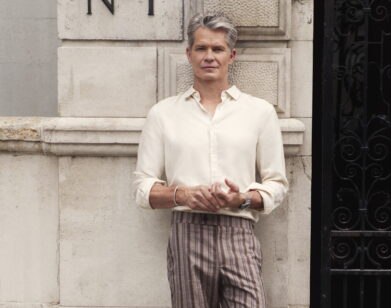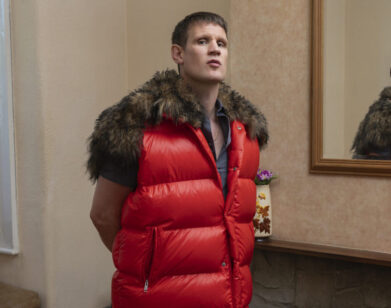Alex Lawther
PHOTOS: MATT HOLYOAK. STYLING: ALEX PETSETAKIS. GROOMING: LIZ DAXAUER/CAREN USING BURBERRY BEAUTY. PHOTO ASSISTANT: LUKE WELLER. STYLING ASSISTANT: JOANNA GYAMERA. RETOUCHING: THE SHOEMAKER’S ELVES.
As a teenager, Alex Lawther hoped to study English at university in London. Instead, at the age of 16, he got cast in his first professional production—a new play called South Downs by David Hare—and his ambitions shifted. South Downs moved from a small auditorium in Chichester to the West End and Lawther signed with an agent. Soon after, he appeared as a young Alan Turing in Morten Tyldum‘s Oscar-winning biopic The Imitation Game. Lawther then set his sights on drama school, and was accepted to RADA, but the acting opportunities were too good to miss: “I eventually turned down my place to do this film Departure,” the now 21-year-old explains over the phone. “It’s a funny thing; I think I’m very pro-drama school. It’s wonderful to be able to work with your contemporaries and to be together in this boiling pot for three years, with everyone interested in the same field,” he continues. “There’s a part of me that wonders if I missed out on that, but I feel like I’m learning an awful lot all the time.”
As of today, the third season of Charlie Brooker’s unsettling anthology series Black Mirror is available on Netflix. If you have the stomach to binge watch the show, you’ll see Lawther as a terrified, timid teenager in the third episode of the season, “Shut Up and Dance,” alongside Game of Thrones’ Jerome Flynn. His performance is uncomfortable, upsetting, and utterly mesmerizing—and as dark as the episode gets, there are moments of almost unbearable humor.
When we spoke with Lawther earlier this month, he was about to attend the premiere of Black Mirror at the London Film Festival (it also screened at TIFF in September). He was wrapping up a film about A.A. Milne in which he plays Christopher Robin before starting work on another film in November. After working non-stop for the last few years, he has several films waiting to come out as well including Trudie Styler’s Freak Show. “At the end of the day, what you’re able to work on is what comes by you, what sort of floats by you,” he tells us. “One big power of an actor is knowing when to say no to something. It can be very tempting to say yes to something, because you’re flattered that somebody would like to work with you and your ego sort of takes over, but it’s important to ask whether there could be something you could add to a project by being part of it.”
EMMA BROWN: Black Mirror is always so unsettling, and your episode is particularly unsettling. What was it like to film? Your character’s got so much going on.
ALEX LAWTHER: I think what’s so wonderful about Charlie Brooker’s writing—I was speaking with Jerome [Flynn] today—is it’s almost getting to a level of a farce, where extraordinary, terrifying things are happening, but because the world is so complete, you remain part of it. You buy into it. When I first read it, I remember—and I hadn’t quite felt it before—being very excited, almost like reading a thriller novel, to get to the end. Then when we came to shooting, because it is a particular story of such darkness, I remember James [Watkins], the director, being very keen to keep things light and, at least in between takes, not to keep ourselves subdued and wallowing in what could otherwise have been quite a bit of a painful job. It could have been harrowing, but instead I was turning up to work everyday and there was a sense of fun that we could have. It sounds sort of perverse, I know, with the themes that we cover, but I think that was the right way to do it. Let the story be frightening and disturbing, but not be worried about feeling disturbed ourselves.
BROWN: If you’re keeping things light between takes, does that make it hard to stay in the moment at all when you’re filming? I’m thinking specifically about Jerome’s amazing monologue outside the bank.
LAWTHER: No. Particularly with an actor like Jerome opposite you in this quite claustrophobic car, as soon as he started speaking, it was relatively easy to feel frightened and get to that place of extreme anxiety. The situation we were playing felt instantly very real. We were lucky in the sense that our particular episode was set in a world that is not too far from our own. When we were filming, we were reading about a similar case in the newspapers, which showed just how Charlie manages to mirror the modern world as it’s happening. For scenes like that, I think when the writing is so precise and coherent, you just stick into the journey wherever you find it.
BROWN: Have you had a chance to see the other episodes?
LAWTHER: No, I’m going to see them this evening. I saw the first and second season having just been a fan of the series, but I’m eagerly anticipating the third season. I’ll see three of them this evening as they premiere at the London Film Festival, and then the rest of them I’ll binge-watch when they come out on the 21st.
BROWN: I can’t watch more than one at once, because each one is so demanding, you need some time afterwards.
LAWTHER: [laughs] You’re right, actually. I think if you watch them all simultaneously, you’d need a few days just to sort of recover. Tomorrow, I’m just going to sit and contemplate the mess of the world as it is in today and have a strong coffee. [laughs] I’ve never been part of a series before where we were each making our own sort of stand-alone film. What’s wonderful about that is you can take one episode and there’s enough stuff in that to keep you thinking for a very long time. I’ll have to think very seriously if I want to sit down and watch them all in one hit. I’m not sure I’m strong enough, or have a strong enough stomach.
BROWN: Like you said before, your episode takes place in a world not so far from our own, and a lot of people have pointed out how there aren’t really any technological advances in this episode. Has anyone come up to you and told you that they’ve covered their webcam since watching it or anything like that?
LAWTHER: [laughs] We were doing press today and someone said, “It really made me think about what I’m doing in front of my webcam.” Not that you might be doing anything wrong, but just the sense of constant surveillance, whether it is by government or whether it’s by individuals … I think what is frightening about it is exactly that, that it can happen and does happen. With us when we were filming, it was in my head, this idea of one’s social online presence and the duplicity between that and who we actually are in our day-to-day lives. I like the fact that in the episode, the hacker remains so anonymous right up until the end. We never quite find out his or her motivations, or where they are, or how they found out these secrets in the first place. I really enjoy the amorality behind this faceless person.
BROWN: I wanted to talk about how you got involved with Black Mirror in the first place. Were they just like, “Do you want to be in an episode?” Did you know what part you were going to play and what it was going to be about? How does it work now that it’s a known entity?
LAWTHER: I wish that I could be so grand as to say they just signed me up and said, “Do you want to be a part?” I did an audition a few months before shooting began. It was, very exciting and I was already a fan. I read the script and sent off my tape and read in front of [the director] James in London. It was really a moment when I was offered the part—it was exactly the sort of work I’d like to be involved in. It’s just brilliant writing and the more I work, the more important I see that it is. It’s the beginning and end of something really—if the script is good, then you’re in a good starting place.
BROWN: Have you ever been involved in a project where they encouraged you to do improv?
LAWTHER: Yes, I worked on a film X + Y, in the States is called Brilliant Young Mind. I think it’s a really beautiful story between Asa [Butterfield] and Sally [Hawkins]. The director, Morgan Matthews, came from a documentary background—his experience was that he had set up a camera and allowed these people to tell their stories. Obviously when you’re working with actors, we are telling other people’s stories, or other characters’ stories. We would run scenes and we would play scenes as written, but then he would say, “Okay, I’m just going to keep the camera rolling, and we’ll see what we get.” It’s another way of filmmaking, but since then, no. I’ve been very, very lucky to work with scripts that I wouldn’t really want to change, because I don’t think that my ideas would be any better than what is written on the page, particularly with Charlie’s script. In the film Departure [2015], it was Andrew Steggall’s first time directing and his first time writing, and he spent so long finessing this incredibly delicate story that if we were improvising or throwing things in, it would have detracted from what was such a clean and quiet story. The joy of it was how little actually anyone said to each other, and the Britishness of how much was then going on underneath.
BROWN: You did your first play, a David Hare play, when you were just 16. Do you come from a fairly artistic family?
LAWTHER: [laughs] Not at all. Even into the run of my first play with David Hare, I didn’t really consider myself as an actor. I just felt like I’d stumbled into a casting room, got a job, and was getting to do something immensely fun eight times a week. Then I think one of the actors in the play asked me if that was what I wanted to do for the rest of my life, and it was the first time I really considered it possible. I think had I not had the luck of that first job, I wouldn’t have really known how to enter into an industry that sometimes feels quite closed, particularly coming from a family that isn’t involved in the arts. It would have seemed maybe a bit silly if I turned around and said I wanted to be an actor until I actually was one.
BROWN: How did you stumble into the casting room?
LAWTHER: There an open casting call in a town called Chichester, which is near where I grew up. They contacted local schools because they wanted boys who had grown up in a similar part of the world that David Hare had. I just thought, “Oh, it would be fun, I’ve never done an audition before, I’ll see what it’s like.” I remember getting there and freaking out, and saying, “Mum, we’ve got to go home, this is so silly,” and she’d driven me half an hour and told me to get out of the car because she wasn’t going to waste the journey. I went into the audition room and read and suddenly I was leading a play on the West End and it was wonderful.
BROWN: And it was a new play.
LAWTHER: Yeah, it was a new play, which is rare. I had never worked before, so I didn’t appreciate how special or unlikely the whole thing was. I was blessed with the naivety of just being able to enjoy it for was it was, never really worrying about prestige or pressure. I think maybe if I had the same job now, I would be filled with much more stress every evening after a show, but at the time, it was just something that I was doing and I would turn up and do it again. [laughs]
BROWN: Were you aware of who David Hare was? He’s quite a big deal.
LAWTHER: [laughs] No, I had no idea. I’d read some plays at school in English, [but] David Hare wasn’t in our curriculum. I lived outside of London, so I wasn’t going to see plays very often—it was only school trips, and we’d go to see Shakespeare. [laughs] I’d hate for David to know that now, but I’m sure he was aware of it at the time. Looking back, I’m sort of amazed at my ignorance. But also, I’m sort of quite glad that I wasn’t caught up with who was who and all of that.
BROWN: Did he come to rehearsal?
LAWTHER: Yeah, he was quite present in the rehearsal room, which was wonderful because the play was sort of semi-autobiographical. Having seen his work and read his work since, there’s something quite moving about being part of a piece by him that was less overtly political, and more about his experiences at school, which is something he hadn’t touched upon in his body of work.
SEASON THREE OF BLACK MIRROR IS NOW AVAILABLE VIA NETFLIX.







